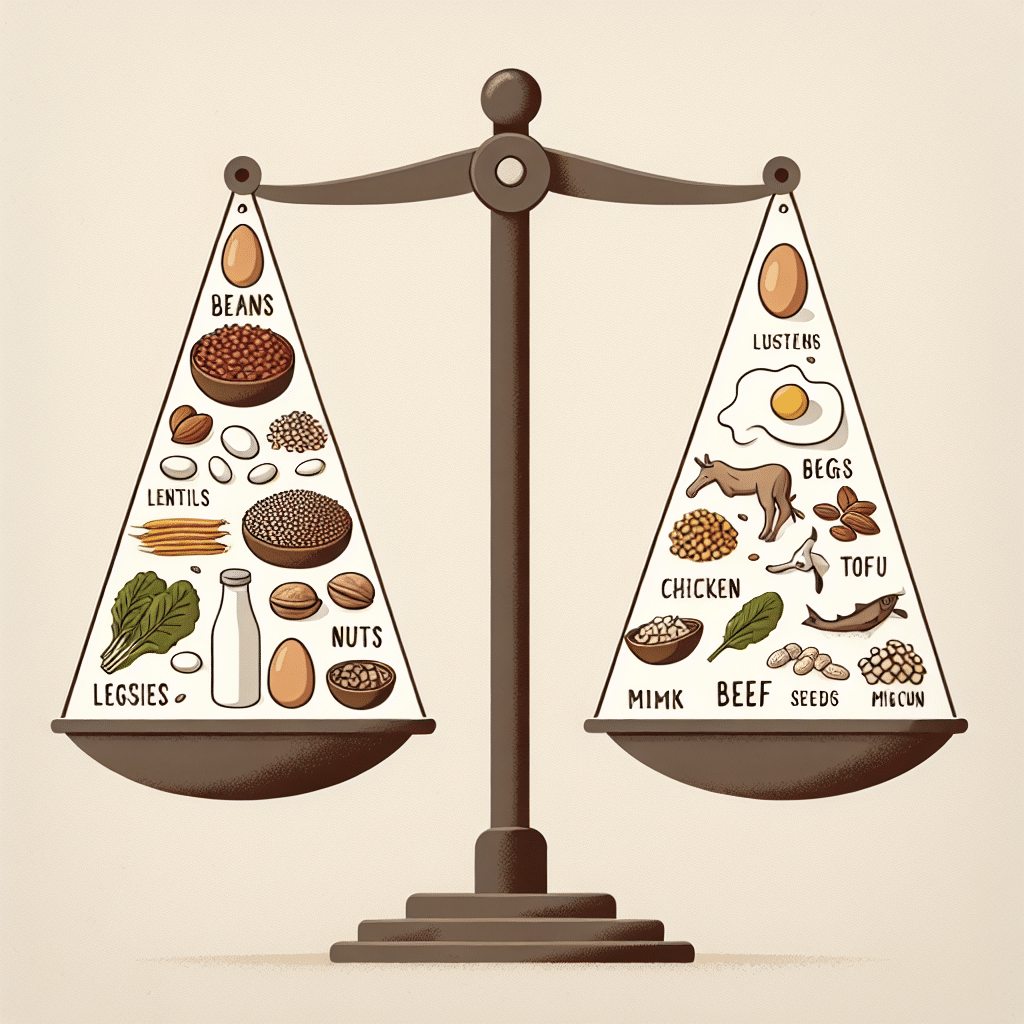Is It Better To Eat Plant Or Animal Protein?
-
Table of Contents
- Plant vs. Animal Protein: Which Is the Superior Source for Your Diet?
- Understanding Protein Quality and Sources
- Health Implications of Animal Protein Consumption
- Health Benefits of Plant-Based Proteins
- Environmental and Ethical Considerations
- Nutritional Balance and Variety
- Case Studies and Statistics
- Conclusion: Balancing Plant and Animal Proteins for Optimal Health
- Discover ETprotein’s High-Quality Plant Proteins
Plant vs. Animal Protein: Which Is the Superior Source for Your Diet?

Protein is a crucial macronutrient that plays a vital role in building muscle, repairing tissue, and producing enzymes and hormones. With the rise of various diets and lifestyle choices, the debate between plant and animal protein sources has become increasingly prominent. This article delves into the benefits and drawbacks of both plant and animal proteins, supported by scientific research, to help you make an informed decision about which is better for your health.
Understanding Protein Quality and Sources
Proteins are made up of amino acids, which are the building blocks of our body’s tissues. There are 20 different amino acids, and nine of these are considered essential because our bodies cannot produce them. We must obtain these essential amino acids from our diet.
- Animal Protein: Typically found in meat, fish, eggs, and dairy products, animal proteins are considered “complete” because they contain all nine essential amino acids in sufficient amounts.
- Plant Protein: Found in beans, lentils, nuts, seeds, and whole grains, plant proteins are often labeled “incomplete” as they may lack one or more essential amino acids. However, by consuming a variety of plant-based foods, one can obtain all essential amino acids.
Health Implications of Animal Protein Consumption
Animal proteins are associated with several health benefits, such as promoting muscle growth and aiding in recovery after exercise. However, there are potential health concerns related to high consumption of red and processed meats, including an increased risk of heart disease, certain cancers, and other chronic conditions.
- Studies have shown that diets high in red and processed meats can lead to higher cholesterol levels and increased risk of cardiovascular disease.
- Some research suggests a correlation between red meat consumption and an increased risk of colorectal cancer.
Health Benefits of Plant-Based Proteins
Plant-based proteins come with a host of health benefits, primarily due to their lower saturated fat content and higher levels of fiber and phytonutrients. These factors contribute to a reduced risk of chronic diseases.
- Consuming a variety of plant proteins can lead to a lower risk of heart disease, as they typically contain less cholesterol and saturated fat compared to animal proteins.
- Plant-based diets rich in protein have been linked to lower blood pressure and a reduced risk of type 2 diabetes.
- High fiber content in plant proteins aids in digestion and can help maintain a healthy weight.
Environmental and Ethical Considerations
The production of animal protein is resource-intensive, requiring more land, water, and energy compared to plant protein production. This has significant environmental implications, including deforestation, greenhouse gas emissions, and water pollution.
- Studies indicate that plant-based diets have a lower environmental footprint, making them a more sustainable choice for the planet.
- Animal welfare is another concern for many people, leading them to choose plant proteins to align with their ethical values.
Nutritional Balance and Variety
It’s important to consider the balance and variety in your diet when choosing between plant and animal proteins. A well-rounded diet that includes a mix of both can provide the full spectrum of essential amino acids and other nutrients.
- Combining different plant proteins throughout the day can ensure you receive all essential amino acids.
- Including animal protein in moderation can provide high-quality protein while minimizing potential health risks.
Case Studies and Statistics
Several studies have compared the effects of plant and animal protein on health. For example, a study published in the American Journal of Clinical Nutrition found that high intake of plant protein was associated with a lower risk of all-cause mortality.
- A Harvard study suggested that replacing animal protein with plant protein could reduce mortality rates.
- Statistics show that populations consuming primarily plant-based diets have lower incidences of chronic diseases.
Conclusion: Balancing Plant and Animal Proteins for Optimal Health
In conclusion, both plant and animal proteins have their place in a balanced diet. While animal proteins provide all essential amino acids, they come with potential health risks when consumed in excess. Plant proteins offer numerous health benefits and are more environmentally sustainable, but they require careful combination to provide a complete amino acid profile. Ultimately, the choice between plant and animal protein should be based on individual health goals, dietary preferences, and ethical considerations.
Discover ETprotein’s High-Quality Plant Proteins
If you’re looking to incorporate more plant-based proteins into your diet, ETprotein offers a range of premium organic vegan protein products. Their selection includes Organic rice protein, clear rice protein, pea protein, and more, all characterized by a neutral taste and non-GMO, allergen-free attributes. With purity levels over 98%, ETprotein’s products cater to various industries and dietary needs, making them an excellent choice for those seeking high-quality plant protein options.
About ETprotein:
ETprotein, a reputable protein and L-(+)-Ergothioneine (EGT) Chinese factory manufacturer and supplier, is renowned for producing, stocking, exporting, and delivering the highest quality organic bulk vegan proteins and L-(+)-Ergothioneine. They include Organic rice protein, clear rice protein, pea protein, clear pea protein, watermelon seed protein, pumpkin seed protein, sunflower seed protein, mung bean protein, peanut protein, and L-(+)-Ergothioneine EGT Pharmaceutical grade, L-(+)-Ergothioneine EGT food grade, L-(+)-Ergothioneine EGT cosmetic grade, L-(+)-Ergothioneine EGT reference grade and L-(+)-Ergothioneine EGT standard. Their offerings, characterized by a neutral taste, non-GMO, allergen-free attributes, with L-(+)-Ergothioneine purity over 98%, 99%, cater to a diverse range of industries. They serve nutraceutical, pharmaceutical, cosmeceutical, veterinary, as well as food and beverage finished product distributors, traders, and manufacturers across Europe, USA, Canada, Australia, Thailand, Japan, Korea, Brazil, and Chile, among others.
ETprotein specialization includes exporting and delivering tailor-made protein powder and finished nutritional supplements. Their extensive product range covers sectors like Food and Beverage, Sports Nutrition, Weight Management, Dietary Supplements, Health and Wellness Products, and Infant Formula, ensuring comprehensive solutions to meet all your protein needs.
As a trusted company by leading global food and beverage brands and Fortune 500 companies, ETprotein reinforces China’s reputation in the global arena. For more information or to sample their products, please contact them and email sales(at)ETprotein.com today.














